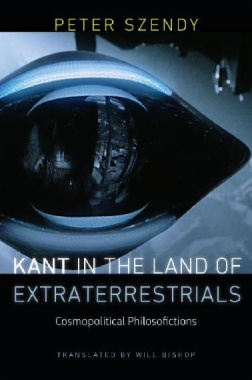“Yes, Kant did indeed speak of extraterrestrials.” This phrase could provide the opening for this brief treatise of philosofiction (as one speaks of science fiction). What is revealed in the aliens of which Kant speaks—and he no doubt took them more seriously than anyone else in the history of philosophy—are the limits of globalization, or what Kant called cosmopolitanism.
Before engaging Kantian considerations of the inhabitants of other worlds, before comprehending his reasoned alienology, this book works its way through an analysis of the star wars raging above our heads in the guise of international treaties regulating the law of space, including the cosmopirates that Carl Schmitt sometimes mentions in his late writings.
Turning to track the comings and goings of extraterrestrials in Kant’s work, Szendy reveals that they are the necessary condition for an unattainable definition of humanity. Impossible to represent, escaping any possible experience, they are nonetheless inscribed both at the heart of the sensible and as an Archimedean point from whose perspective the interweavings of the sensible can be viewed.
Reading Kant in dialogue with science fiction films (films he seems already to have seen) involves making him speak of questions now pressing in upon us: our endangered planet, ecology, a war of the worlds. But it also means attempting to think, with or beyond Kant, what a point of view might be.
- Front Cover
- Half-title
- Title page
- Copyright information
- Table of contents
- List of Figures
- Acknowledgements
- Chapter 1. Introduction: “Under the Happy Shadow and Secure Protection”
- Chapter Organization of the Book
- The History of Jews in Mantua
- Marks, Surveillance, and Ghettoization of Jews in Early Modern Italy
- Derisive Representation of Jews in Carnival Performance
- Literary and Textual Presentations of and by the Jews
- Jewish Cultural Institutions
- Communal Celebrations and Space
- The Role of Women
- Social Structures and Dynamics within the Jewish Community
- Institutions for Regulating the Jewish Community
- The Idea of Exchange
- Chapter 2. Beginnings: Jews and the Early Modern Italian Stage 1475–1540
- The Backdrop: Theatre Experiments in Northern Italy
- The First Theatrical Performances by the Jews of Pesaro
- Theatre-Making in Ferrara
- Isabella D’Este As a Conduit for Theatre-making Influences Between Ferrara and Mantua
- Early Theatre-Making by the Jews of Mantua
- Mantuan Performances by the Jews and Scenic Innovations
- Chapter 3. A Canny Theatrical Intermediary
- Early Years
- Other Cities of Temptation and Learning
- Interculturalism and Bilingual Art
- A Comedy of Betrothal (Ṣaḥuth Bediḥuta Deqiddushin): the First Hebrew Play
- Mapping the Levant Through Performance
- De’ Sommi, 1560s Mantua, and the Birth of an Intercultural Theatre-Maker
- De’ Sommi and the Dialoghi: Strengthening Jewish Theatre-making in Mantua
- Maturation and Sedimentation of De’ Sommi’s work in the 1570s and 1580s
- De’ Sommi’s Dexterity in Cultivating Patrons
- De’ Sommi as Advocate for the Jewish Community
- Exit With Fireworks
- Chapter 4. A Virtuoso of Jewish Mantua
- Basilea: A Closer Look at the Man
- Chapter 5. Jewish Theatrical Production in the Shadow of the Counter-Reformation
- The Counter-Reformation and its Effect on the Everyday Lives of the Jews of Mantua
- Paradigmatic Shift of Performance
- Jews as Contractors in Vincenzo’s Extravagant Age
- Legal and Economic Dealings Between Jews and Actors
- Desirability and Surveillance of Jewish Performers in the Counter-Reformation
- The Intimacy of Exchange
- Chapter 6. The End of Jewish Performance in Mantua
- The End of Committed Gonzaga Patronage
- The War of Mantuan Succession and its Devastating Effects
- Internal Tensions Within the Jewish Community
- Mantuan Theatre as a Forum for Debate and Exchange
- A Coda: Theatre and Conversion
- Chapter 7. Conclusion
- Appendix 1. Translation of Description of Jewish Performance in Pesaro in 1475
- Appendix 2. Jewish Performances in Mantua
- Bibliography
- Primary Sources and Archives Consulted
- Archival and Primary Sources
- Primary Sources in Translation
- Reference Sources
- Secondary Sources
- Index

